Introduction
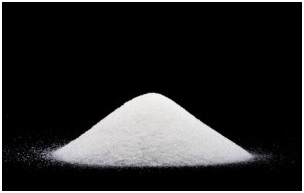 Glycine is one of many amino acids that commonly comprise protein. It is the smallest of all amino acids and is incredibly important for the synthesis of other amino acids, glutathione, creatine, heme, RNA/DNA, and it can also help with the absorption of calcium in the body (R,R2).
Glycine is one of many amino acids that commonly comprise protein. It is the smallest of all amino acids and is incredibly important for the synthesis of other amino acids, glutathione, creatine, heme, RNA/DNA, and it can also help with the absorption of calcium in the body (R,R2).
topshape100 have 22,2% glysine.
1) Glycine is an Anti-inflammatory
 Glycine acts directly on inflammatory cells to suppress activation of transcription factors, the formation of free radicals, and inflammatory cytokines (R).
Glycine acts directly on inflammatory cells to suppress activation of transcription factors, the formation of free radicals, and inflammatory cytokines (R).
Glycine reduces TNF-alpha, and increases interleukin-10 (R).
Glycine can reduce TNF-receptor I levels, and raise interferon (IFN)-gamma levels in diabetic patients (R).
Glycine significantly inhibits NF-κB activation and IL-6 production in heart artery cells (R).
Glycine increases the anti-inflammatory IL-10 production in toxin-induced liver injury, increasing rat survival rates (R).
Glycine significantly improves toxin-exposed mice survival rates by lowering TLR4 and TNF-alpha, and inhibiting Nf-kB (R).
Feeding rats diets high in glycine (5%) totally prevented death after exposure to an injection of an toxin (E Coli) by blunting TNF-alpha. Whereas 50% of the control group died within 24hrs (R).
In this same study, glycine fed rats who had liver damage and also injected with a toxin had an 83% survival rate, whereas the non-glycine control group had 0% rate of survival (R).
Glycine plays an important role in reducing oxidative stress in the body (R).
As a precursor to glutathione, glycine can restore previously lowered levels of glutathione (R,R2).
2) Glycine Helps You Sleep and Function Better on Less Sleep
 Taking glycine before sleep improves sleep quality and sleep efficacy by increasing the time to fall asleep, and slow wave deep sleep (R).
Taking glycine before sleep improves sleep quality and sleep efficacy by increasing the time to fall asleep, and slow wave deep sleep (R).
After taking glycine for sleep, the following day subjects had lessened daytime sleepiness and improved performance of memory recognition tasks (R).
Glycine helps improve REM sleep and decrease non-REM sleep (R).
3g Glycine given to volunteers before sleeping resulted in improvements in fatigue, ‘liveliness and peppiness’, ‘clear-headedness’ (R).
Glycine appears to improve daytime sleepiness and fatigue induced by sleep deprivation (R).
Glycine affects certain neuropeptides in the SCN (suprachiasmatic nucleus) in the region in the hippocampus which regulate the circadian rhythm (R).
Specifically, glycine increases VIP, which is critical to the circadian rhythm.
This effect on the SCN indirectly contributes to reducing sleepiness and fatigue induced by sleep restriction (R).
3) Glycine Improves the Skin
 Glycine (through the consumption of collagen) significantly improves skin elasticity in elderly women, and improved skin moisture and water loss (R,R2)
Glycine (through the consumption of collagen) significantly improves skin elasticity in elderly women, and improved skin moisture and water loss (R,R2)
Collagen peptide is beneficial in suppressing UV-B induced skin damage and photoaging (R).
Women taking 2.5g of collagen peptide for 4 weeks significantly reduced eye wrinkles by 20%, with positive effects lasting after the study ended (R).
At 8 weeks, collagen significantly improved skin content of procollagen type I by 65%, and elastin by 18% (R) .
Glycine increases the speed by nearly double of which skin ulcers heal (R) .
Glycine enhances wound healing in diabetic animal models (R).
Glycine in combination with l-cysteine and dl-threonine topically applied to leg ulcerations significantly improved the degree of wound healing and decreased pain (R).
4) Glycine Helps the Gut
 Glycine inhibits stomach acid secretion and protects against chemical and stress-induced ulcers (R).
Glycine inhibits stomach acid secretion and protects against chemical and stress-induced ulcers (R).
Glycine possesses significant anti-ulcer activity (R).
Glycine prevents chemically induced colitis in animal models (R).
Glycine prevents alcohol-induced stomach lesions (ex. ulcers) when used as a pretreatment in animal models (R) .
Glycine can dramatically help increase the tolerability of Aspirin in the upper GI tract(R).
In small intestine grafts, glycine improves smooth muscle dysfunction after transplantation as well as reduces inflammation (R).
Glycine, but not L-arginine, is able to maintain intestinal wall integrity and mucosa in cancer treatment irradiation in animal models (R).
Glycine has protective effects against oxidative stress in intestinal cells in test tubes(R).
5) Glycine May Help Your Thyroid
Glycine might also increase the conversion of T4 to T3 in liver. (but this has only been studied in Trout) (R).
6) Glycine Can Help the Brain
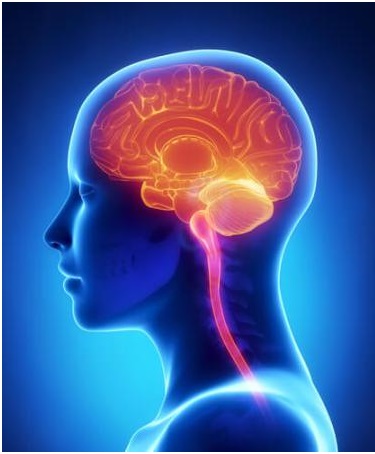 Small amounts of glycine have been shown to dilate the microvessels in the brain by up to 250% (R,R2).
Small amounts of glycine have been shown to dilate the microvessels in the brain by up to 250% (R,R2).
In rats with alcohol poisoning, glycine was able to reduce the accumulation of cholesterol, free fatty acids and triglycerides in blood circulation, liver and brain. Ultimately, this decreases swelling in the brain (R).
A shortage of glycine in the brain can negatively influence the brain neurochemistry, synthesis of collagen, RNA/DNA, porphyrins, and other important metabolites (R).
7) Glycine Helps Mental Illnesses
 Glycine supplementation has been shown in one instance over the course of 5 years to significantly reduce symptoms of OCD and body dysmorphic disorder (R).
Glycine supplementation has been shown in one instance over the course of 5 years to significantly reduce symptoms of OCD and body dysmorphic disorder (R).
Glycine has positive results when used in the treatment of obsessive-compulsive disorder in adults (R).
Glycine supplementation significantly reduced symptoms of schizophrenia (R).
In treatment-resistant schizophrenia glycine improved cognitive and depressive symptoms (dosed at 0.8g/kg).
Interestingly, the group who made the most improvement were also the most deficient in glycine (R).
Glycine helps in chronic schizophrenia by increasing NMDA-receptor-mediated neurotransmission (R).
This effect on NMDA-receptor-mediated neurotransmission allows for glycine to work synergistically with schizophrenia medication (R).
8) Glycine May Help Combat Depression
 Depression is associated with lower levels of blood glycine,as well as high levels of taurine (R).
Depression is associated with lower levels of blood glycine,as well as high levels of taurine (R).
9) Glycine May Reduce Obesity
 Glycine increases adiponectin, which can help with weight loss (R).
Glycine increases adiponectin, which can help with weight loss (R).
10-11) Glycine Helps With Diabetes and Metabolic Disorders
 Glycine helps with diabetes and metabolic disorders (R) .
Glycine helps with diabetes and metabolic disorders (R) .
Glycine intake decreases free fatty acids in blood, fat tissue cell size, and blood pressure in sucrose-fed rats (R).
Glycine reduces glycated hemoglobin (A1C), a risk factor associated with poor blood glucose management in patients with type 2 diabetes. The dose was 5g/d (R).
5g Glycine taken in the morning increased total insulin response in healthy first-degree relatives of Type 2 diabetes patients (R).
Glycine stimulates the secretion of a gut hormone (glucagon) that helps insulin remove glucose from circulation (R).
Diabetic patients have 26% lower blood glycine levels than “normal” population (R).
Glutathione synthesis is restored in patients with uncontrolled diabetes and hyperglycemia with glycine (+cysteine) added to their diet (R).
Glycine helps patients with oxidative stress in the development of metabolic syndrome (R).
12) Glycine May Help Glucose Balance
Glycine helps with lipid profiles in insulin-resistant patients (but not insulin resistance) (R).
Glycine can help with positive glucose management by stimulating the production of Glucagon, a hormone which helps potentiate the action of insulin (R).
Glycine helps HIV patients restore insulin sensitivity (R).
13) Glycine Helps Reduce Inflammation From High Fructose
In mice fed with various types of sugar, TNF-alpha is significantly higher in mice fed fructose (R).
Glycine has protective properties against the harms of Fructose by its ability to prevent the release of the inflammatory cytokines (TNF-α, IL-6) release with fructose exposure (R).
14-15) Glycine Helps Your Heart and Lowers Blood Pressure
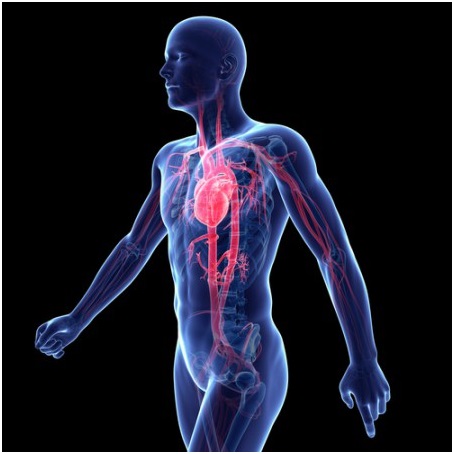 In heart attack conditions (Post-ischaemic reperfusion) glycine can prevent the death of heart muscle cells by inhibiting mitochondrial permeability (R).
In heart attack conditions (Post-ischaemic reperfusion) glycine can prevent the death of heart muscle cells by inhibiting mitochondrial permeability (R).
Glycine depletion within cells during a heart attack (hypoxia/re-oxygenation) makes the heart cells more vulnerable to cell death (R).
Glycine can lower systolic blood pressure in patients with metabolic syndrome(R,R2).
16-18) Glycine Helps with Joints, Bones, and Muscle
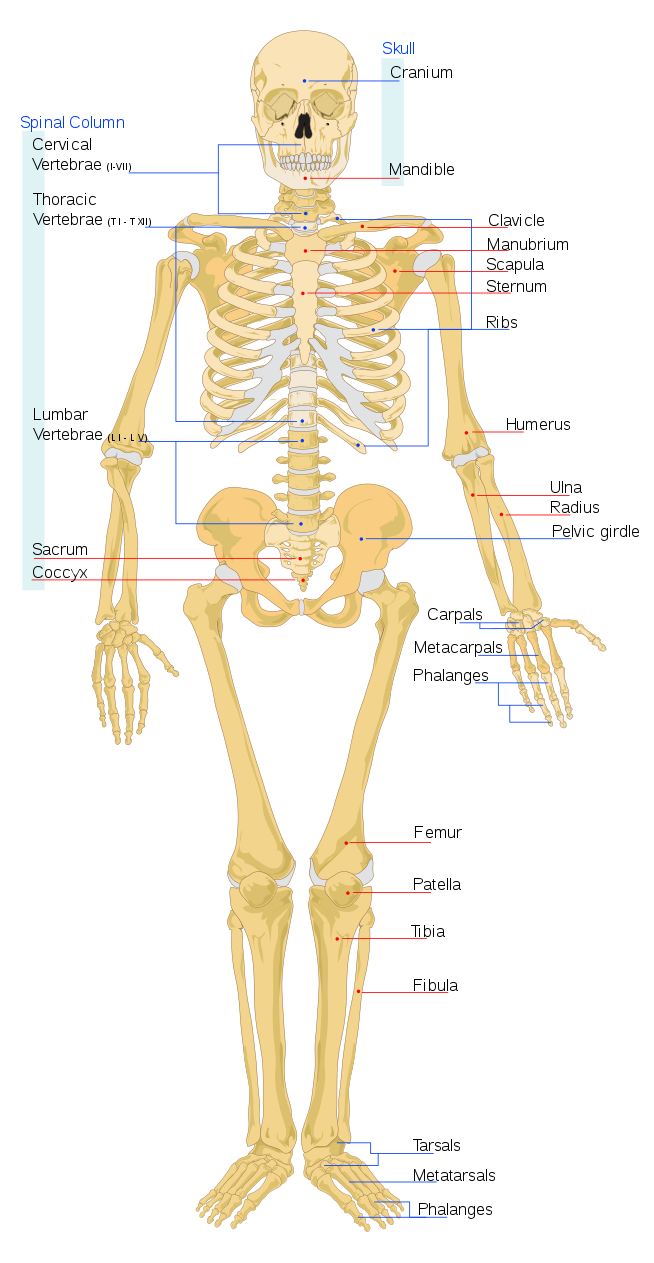 Glycine can help body composition and muscle strength in people with HIV (R).
Glycine can help body composition and muscle strength in people with HIV (R).
Glycine protects against (peptidoglycan polysaccharide -induced) arthritis (R).
Glycine combined with green tea benefits tendon recovery processes after tendinitis by better collagen bundling organization (R).
Glycine can potentially help in menopause because of its estrogen -like bone protective effects (R).
Glycine plays a large role in maintaining the health of mice suffering from osteoarthritis (R).
19) Glycine Helps the Liver
Glycine prevents lactate dehydrogenase leakage (a cell death indicator) in rat liver cells in test tubes (R).
 In rats with alcohol poisoning, feeding glycine reduced accumulation of cholesterol, phospholipids, free fatty acids and triglycerides in blood circulation, liver, and brain, ultimately reversing liver disorder associated with fat accumulation (R).
In rats with alcohol poisoning, feeding glycine reduced accumulation of cholesterol, phospholipids, free fatty acids and triglycerides in blood circulation, liver, and brain, ultimately reversing liver disorder associated with fat accumulation (R).
In rats deficient in choline and methionine, glycine supplementation prevents liver injury (R).
Glycine reduces liver damage and decreases mortality rates in rats suffering from a serious bacterial infection (sepsis) (R).
Glycine was able to maintain Vitamin D blood levels in animals models with induced liver disease (bile duct ligation), and also slow liver damage (R,R2)
Supplementation of glycine for five days in animal models prior to complete or partial liver donation significantly inhibited liver injury and liver related enzymes (R).
Glycine maintains mitochondrial activity and bile composition in liver injury in animals (R).
20) Glycine Slows Alcohol Absorption
Glycine slows alcohol absorption by reducing the rate at which the stomach absorbs alcohol as well as empties into the intestine (R).
Blood alcohol levels were significantly lower in individuals who had consumed glycine prior to intoxication over controls who had not (R).
21) Glycine Helps the Kidneys
Kidney tubes (proximal tubules) are resistant to oxygen deprivation damage if glycine is present in the test tube (R).
22) Glycine Prevents Cavities
In rat models, supplementation with 4% glycine caused 65.7% reduction of cavity occurrence (R).
23) Glycine Can Help Stroke Patients
In ischemic stroke patients, taking glycine 1-2g/day normalized autoantibodies, reduced glutamate and aspartate levels, increased GABA concentrations, and reduces lipid peroxidation (R).
Those who consume regularly low doses of glycine actually reduce damage in future strokes (R).
The glycine treatment at the dose of 1-2g/day was accompanied by a tendency to a decreased risk of dying over 30-days (R).
500mg/kg glycine combined with 500mg/kg Piracetam, improved cognitive impairments and promoted recovery in the prefrontal cortex in animals with a stroke (R).
Note: Some of the scientific sources obtained for this article was found on Vladamir Heiskanen’s blog.
Dietary requirements
Glycine is sometimes called a semi-essential nutrient because it is both made by the body and obtained from food, although the combination of the two is not always enough to supply various tissues, bone, muscle, and skin with what is needed.
The average person usually can make roughly 3g of glycine, and usually consume 1.5 – 3.0 g from food, making their daily intake from roughly 4.5 – 6g (R).
Clinical and nutritional studies over twenty years indicate that the amount of glycine available in humans is not enough to meet metabolic needs and that a dietary supplement is appropriate (see body of study) (R).
One study suggests that humans may fall significantly short of the amount needed for all metabolic uses – by about 10 g per day for a 70 kg (154 lbs) human (R).
How Much Glycine Do I Take?
I try to get in about 3-5g of extra glycine daily, either from pure Glycine Powder or from 20g of Collagen (topshape100.com have 22% glysine – 1 dl powder and yo get app. 7 g glysine) .
Side Effects of Glycine
Slight sedation is a possible side effect of taking Glycine (R). This is often why it is recommended to take in the evening. When you take topshape100.com you will not have this problem.
Potential Downsides of Glycine
In a Japanese study of nearly 30,000 patients, the risk of dying after stroke may be increased by meat consumption. The scientists suggest it is the increase in glutamic acid and glycine which cause this correlation (R).
How you can benefit topshape100.com:
Topshape100.com have excellent amino acid composition for healthy care. It have 22,2% glysine.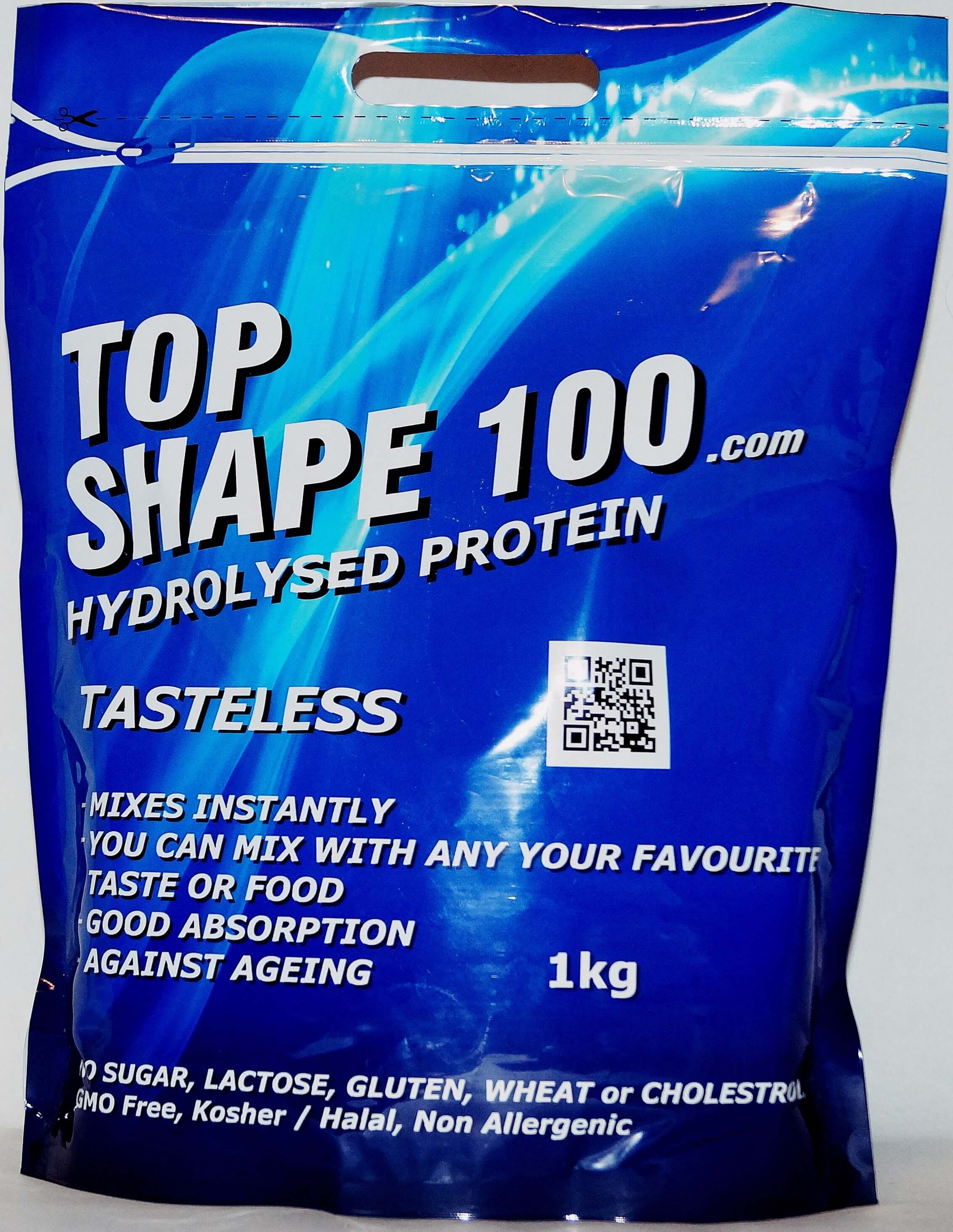
With topshape100.com you can do following:
- Dink or eat it 1 dl (n. 35g protein) / day as your favorite ways. This you can do by adding teaspoon time to time to your drinks and food (You can also use it “style” like sugar powder or make one drink and use it during a day).
- Or you can mix 1 dl powder to 2-5 dl water. Drink just like that or mix with anything.
Good and easy digestive protein & glysine source is very important for your body recover and growth. This is the natural way of your own body to fulfill the needs from inside.







